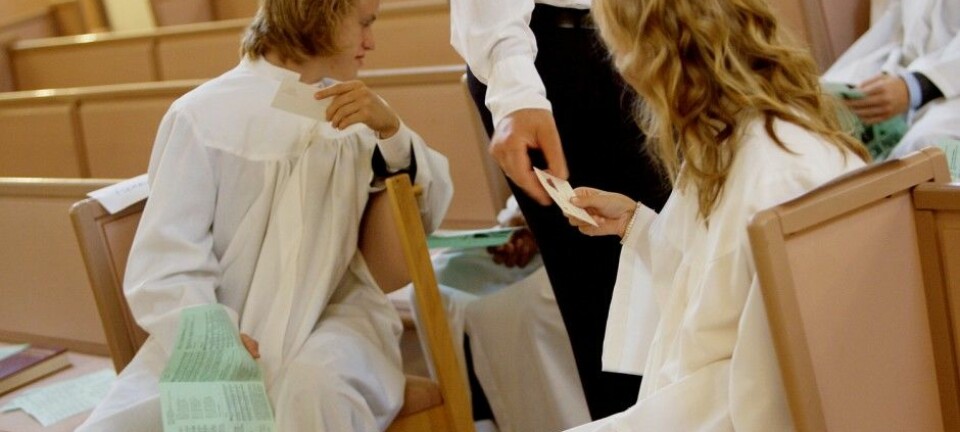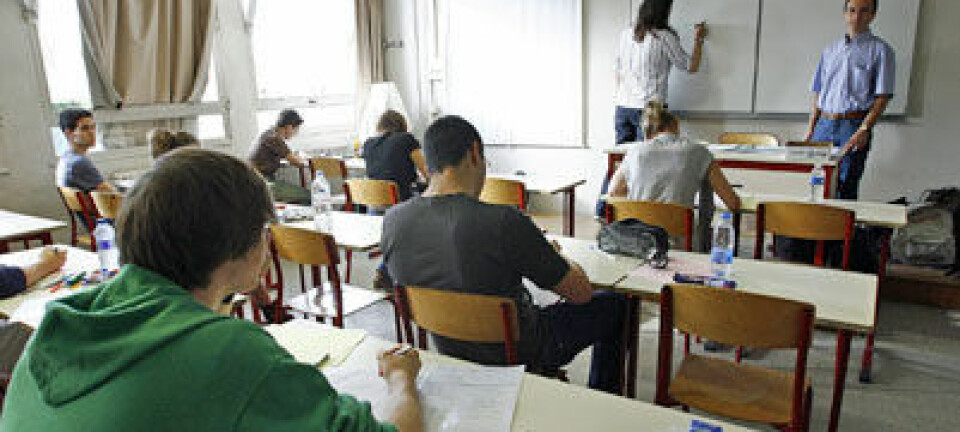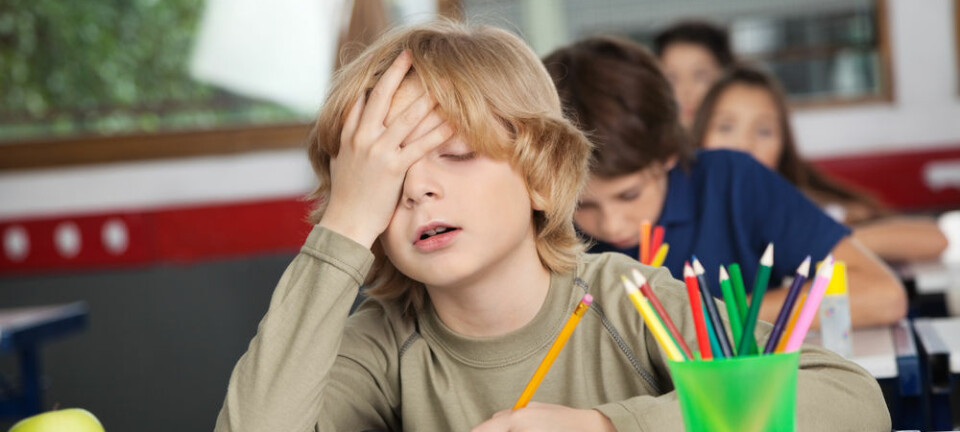
Sex education is failing young people
A new study of sex education around the world shows that teenagers feel embarrassed, teachers are ill-prepared, and the course content is outdated and stereotyped.
Sex Education. Two words that are guaranteed to make your toes curl. And whether you come from Sweden or Japan, the chances are that you feel the same, according to a new study.
Surveys of teenagers’ opinions on their experience with school-based sex and relationship education (SRE) from across Europe, the Americas, the Middle East, Australia and Asia, are almost universally damning.
Course content is often outdated, negative, and narrow focused, they say. And it is taught by teachers who are ill-prepared for such a sensitive and often embarrassing subject.
“Schools need to acknowledge that sex is a potentially embarrassing and anxiety provoking topic. At present schools don't take account of this when organising the delivery of SRE,” says lead author Pandora Pound, from the University of Bristol, UK.
I often find that when I go into schools in Denmark, that these pedagogical approaches are often forgotten and the teacher just plays a movie. Because that’s an easy, and understandable, choice if the teacher feels incompetent or uncomfortable with these topics.
“They attempt to teach it in the same way as other subjects, like history or maths, but this fails young people and the school teachers who have to deliver it,” she says.
Despite these failings, school-based SRE is widely regarded by researchers as vital to improving young people’s sexual health as well as safeguarding them and “helping to combat child sexual abuse and exploitation”, Pound writes in the new study, which is published in the scientific journal BMJ Open.
From Sweden to Brazil: Sex Ed does not cut it
In the new study, Pound and her colleagues gathered data from surveys on teenagers’ experiences with SRE from Sweden, the UK, Ireland, USA, Australia, New Zealand, Canada, Japan, Iran, and Brazil.
They brought together the findings from 48 published studies, which met certain criteria for methodology, quality, and relevance.
“The striking thing was how consistent young people’s views were despite the wide geographical reach,” says Pound.
“You might think that some studies would produce highly contrasting data, such as the studies from Japan or Iran but this wasn’t the case. Young people’s views were striking consistent wherever they came from,” she says.
Read More: Mixed messages in Christian sex education
Sex and relationships taught as ‘problems’ to be managed
Effective sex education in the classroom comes with a distinct set of challenges, as it deals with personal, private issues in a public space, and both sexes reported unique insecurities when it comes to the sensitive topic of sex.
“Young men are anxious about any sexual ignorance being revealed, while young women can be vulnerable to verbal harassment or attacks on their sexual reputations if they participate in lessons,” says Pound.
“Meanwhile, school teachers’ lack of expertise leaves them vulnerable in lessons. The result can be awkward, painful and unsatisfactory for all involved,” she says.
The researchers found that many schools did not acknowledge that their students may already be sexually active, and that sex education classes do not cover the full range of sexual activity and orientation that pupils would like.
“Young people reported that SRE focused too much on heterosexual intercourse. Unless schools take this on board, SRE content will continue to come across as irrelevant to many young people and out of touch with the reality of their lives,” says Pound.
Read More: Watching sex on TV does not make teenagers sexually active
A more positive and inclusive approach is needed
Students were not only dissatisfied with course content. They also felt uncomfortable talking about sex and relationships with their teachers who are trained to cover regular academic subjects like trigonometry or modern history, but not sexual health. Their survey responses reported blurred teacher-pupil boundaries, as a result.
“Their feedback indicated that having SRE delivered by familiar teachers could disrupt existing relationships with teachers; they found it awkward or ‘cringey’ to hear their teachers speaking about sex and relationships and felt that having teachers deliver SRE could potentially compromise privacy and confidentiality,” says Pound.
But these issues are unlikely to be solved by improved teacher training. The solution is that sex education should be taught by independent experts who can communicate positive messages while retaining clear boundaries, she says.
“We need to get the delivery right otherwise young people will disengage from SRE. Perhaps a compromise would be specialist SRE teachers who only deliver SRE and whom students would not encounter except in the context of SRE,” says Pound.
Read More: Game-based sex education
Colleague: an impressive synthesis
Line Anne Roien, is a Ph.D. student from the Danish School of Education, Aarhus University, Denmark. She was not involved in the new research but has studied and written extensively on sex education policies and practices in Denmark and the Nordic countries.
She is impressed by the results, which confirm what researchers have known for some years.
“It’s very interesting,” she says. “The picture is what we expect and what we already know--young people find that sex education happens too late, too little, it’s too negative, and generally out of touch with their everyday lives.”
A previous study in Denmark found that only one third of students surveyed where satisfied with the sex education that they had received, and the level of satisfaction was lowest among students who had the most sexual experience, says Roien.
“But it’s really important to bring this knowledge together and synthesise it, so that we don’t just stop there, but we actually try to dig into why it’s irrelevant and what the consequences are,” she says.
Read More: Sexual abuse: Talking across cultures
Lessons for, and from the Nordics
Many of issues raised are already addressed in Nordic schools, says Roien, which have a long history of sex education dating back to the 1950s in Sweden, for example.
Experts from NGOs and school nurses supplement regular school sexual education programs, while school curricula across the Nordic countries are designed to incorporate sex education into all regular academic classes. Chlamydia statistics can crop up in a Danish maths class for instance, or romance may become the focal point of a Swedish literature lesson.
Exposing kids to information about sex and relationships on a daily basis within their current subjects means that these issues become a part of pupils’ personal and social development, where they gradually learn how to address them in respectful dialogues with their peers, says Roien.
Anecdotal evidence (not published research) suggests that such approaches work well and this is something that other countries could learn from, she says, but there are pitfalls.
For example, many schools do not prioritise these approaches and teachers do not receive any additional, specialised training to approach these issues in the classroom.
“All the things that young people ask for in this paper--being engaged and using active methodologies--is something that Nordic schools practice already. But I often find that when I go into schools in Denmark, that these pedagogical approaches are often forgotten and the teacher just plays a movie. Because that’s an easy, and understandable, choice if the teacher feels incompetent or uncomfortable with these topics.”
But schools are still the main source of knowledge on sexual health among the students surveyed.
“Even though they find it problematic, it’s important. Schools are very relevant and meaningful arenas for sexuality education, but I don’t think that anybody has found the perfect way to address it, yet,” says Roien.









